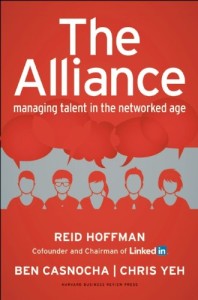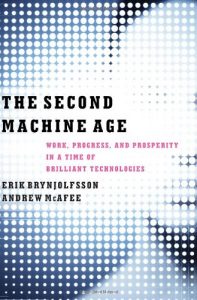Summer seems to offer more opportunities for reading. The pace in business lessens as people take vacations, kids are out of school, and the hot weather beckons us to slow down. While the lure of the latest best seller might be strong, this summer offers a crop of new business books you may want to consider. From the LinkedIn founder’s take on talent management and retention in the 21st century to Pixar’s unique success story through the realm of creativity, these books may be just as entertaining as the latest beach read.
Here are five of the most interesting, spanning a variety of topics:
 The Key: How Corporations Succeed by Solving the World’s Toughest Problems, Lynda Gratton (McGraw-Hill, 2014). Lynda Gratton is an organizational change expert and believes that companies, with their organizational abilities and influence, have the power to address global challenges. Further, companies can strengthen their organizations by investing and nurturing relationships with employees, working within their respective communities, and using their resources to solve global challenges such as climate change.
The Key: How Corporations Succeed by Solving the World’s Toughest Problems, Lynda Gratton (McGraw-Hill, 2014). Lynda Gratton is an organizational change expert and believes that companies, with their organizational abilities and influence, have the power to address global challenges. Further, companies can strengthen their organizations by investing and nurturing relationships with employees, working within their respective communities, and using their resources to solve global challenges such as climate change.
 Creativity, Inc.: Overcoming the Unseen Forces that Stand in the Way of True Inspiration, Ed Catmull (Random House, 2014). Ed Catmull is one of the co-founders of Pixar Animation, and while anyone interested in the company itself may find the trajectory compelling, the lessons in creativity and management make it broadly appealing. From the introduction: “I believe, to my core, that everybody has the potential to be creative…and that to encourage such development is a noble thing. More interesting to me, though, are the blocks that get in the way, often without us noticing, and hinder the creativity that resides within any thriving company.”
Creativity, Inc.: Overcoming the Unseen Forces that Stand in the Way of True Inspiration, Ed Catmull (Random House, 2014). Ed Catmull is one of the co-founders of Pixar Animation, and while anyone interested in the company itself may find the trajectory compelling, the lessons in creativity and management make it broadly appealing. From the introduction: “I believe, to my core, that everybody has the potential to be creative…and that to encourage such development is a noble thing. More interesting to me, though, are the blocks that get in the way, often without us noticing, and hinder the creativity that resides within any thriving company.”
 The Upside of Down by Megan McArdle (Viking, 2014) If you can learn from failure, you can succeed, says McArdle, whose book covers corporations and individuals who have risen from the ashes. Through interviews, academic research, and personal experience, she explores in depth what most seek to avoid. Fans of Malcolm Gladwell and Daniel Pink may gravitate toward this book.
The Upside of Down by Megan McArdle (Viking, 2014) If you can learn from failure, you can succeed, says McArdle, whose book covers corporations and individuals who have risen from the ashes. Through interviews, academic research, and personal experience, she explores in depth what most seek to avoid. Fans of Malcolm Gladwell and Daniel Pink may gravitate toward this book.
 The Alliance: Managing Talent in the Networked Age, Reid Hoffman, Ben Casnocha, and Chris Yeh (Harvard Business Review Press, 2014) The traditional manner of employment has gone out the window, argue Hoffman, cofounder of LinkedIn, and his coauthors. Stable employer-employee relationships have become highly unstable and subject to the whims of the market – employees move around more, and layoffs and staff reductions have become de rigeur. The authors contend that implementing a concept called a “tour of duty,” a contract with a specified period of time, would help to build trust between employers and employees and result in nimble, successful companies and happier employees.
The Alliance: Managing Talent in the Networked Age, Reid Hoffman, Ben Casnocha, and Chris Yeh (Harvard Business Review Press, 2014) The traditional manner of employment has gone out the window, argue Hoffman, cofounder of LinkedIn, and his coauthors. Stable employer-employee relationships have become highly unstable and subject to the whims of the market – employees move around more, and layoffs and staff reductions have become de rigeur. The authors contend that implementing a concept called a “tour of duty,” a contract with a specified period of time, would help to build trust between employers and employees and result in nimble, successful companies and happier employees.
 The Second Machine Age, by Eric Brynjolfsson and Andrew McAfee (Norton, 2014) The Industrial Revolution was the first machine age, and we have entered into the second. Technology has transformed our economy, and will continue to, according to the authors, who are a professor and research scientist at MIT, respectively. Their predictions seem dire: companies will fail, employment will not rise, and traditional professions such as truck driving or even law will be adversely affected. While this may seem pessimistic, they believe the outlook is optimistic, if we can adapt and overcome. Brynjolfsson and McAfee recommend revamping education, embracing technologies that use human and technological intelligence, and reforming government policy.
The Second Machine Age, by Eric Brynjolfsson and Andrew McAfee (Norton, 2014) The Industrial Revolution was the first machine age, and we have entered into the second. Technology has transformed our economy, and will continue to, according to the authors, who are a professor and research scientist at MIT, respectively. Their predictions seem dire: companies will fail, employment will not rise, and traditional professions such as truck driving or even law will be adversely affected. While this may seem pessimistic, they believe the outlook is optimistic, if we can adapt and overcome. Brynjolfsson and McAfee recommend revamping education, embracing technologies that use human and technological intelligence, and reforming government policy.
A little downtime in the longer, slower days of summer may provide more time to reflect and savor a good book. The latest release of business offerings may prove more thought-provoking and socially conscious.





